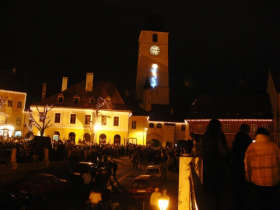Capital of Culture Conclave in Sibiu
Les Rencontres, the association of past and upcoming European Capitals of Culture, recently held a meet-and-greet in Sibiu, Rumania, the city that’s currently sharing Capital of Culture honors with Luxemburg. Ulrich Fuchs updated attendees on Linz09.
Les Rencontres, the association of all previous and upcoming European capitals of culture, recently invited Linz09 Deputy Artistic Director Ulrich Fuchs to Sibiu, Rumania, this year’s co-honoree (together with Luxemburg), to talk about how preparations are coming along for Linz’s big year in 2009. There, he joined Marius Constantin, the man in charge of Sibiu’s artistic program, Vilnius 2009 Artistic Director Giedrė Kabašinskienė, and the organizers of Les Rencontres in a discussion of a focal-point issue for 2008: intercultural dialog and the best strategies to showcase cultural diversity.Of course, Sibiu (German name: Hermannstadt) began its involvement with dialog and diversity long before being named 2009 European Capital of Culture. Today, this city of 160,000 inhabitants can look back on a past that has been eventful to say the least. The motto of Sibiu’s Capital of Culture year brings it to a point: “Young since 1191.” Founded by German settlers in the Middle Ages, characterized by the coexistence of four religions, three nationalities and the Romany ethnic group, and reflecting the substantial impact of the Freemasons in the late 18th century, Sibiu has continued along the path of tolerance, learning and enlightenment. These virtues are personified by some of the city’s most notable native sons: Baron Samuel von Brukenthal, Samuel Hahnemann, the founder of homeopathy, and radical philosopher E. M. Cioran.
Evidence of the broad-based social consensus prevailing in Sibiu was delivered by the results of the recent mayoral election in which Klaus Johannis, a descendant of Siebenbürger Saxons, garnered 90% of the vote in winning re-election. He thus received a mandate not only from the Rumanian majority but also from the Hungarian, German and Romany minorities in this city at the foot of the Carpathians.
Potential forms of cooperation, intensified networking and how to further develop existing synergy effects occupied the center of attention during the discussions in which Ulrich Fuchs participated at Les Rencontres’ meet-and-greet in Sibiu. Other attendees included many representatives of cities that are current applicants for the honor of serving as European Capital of Culture.
P.S.: Historian and sociologist Lisa Fischer recently published a brief account of the history of Sibiu/Hermannstadt under the title "Was heißt denn da Provinz?" in the Spectrum supplement of the Austrian daily newspaper Die Presse. It’s available online at www.diepresse.com (search keyword: Sibiu).






